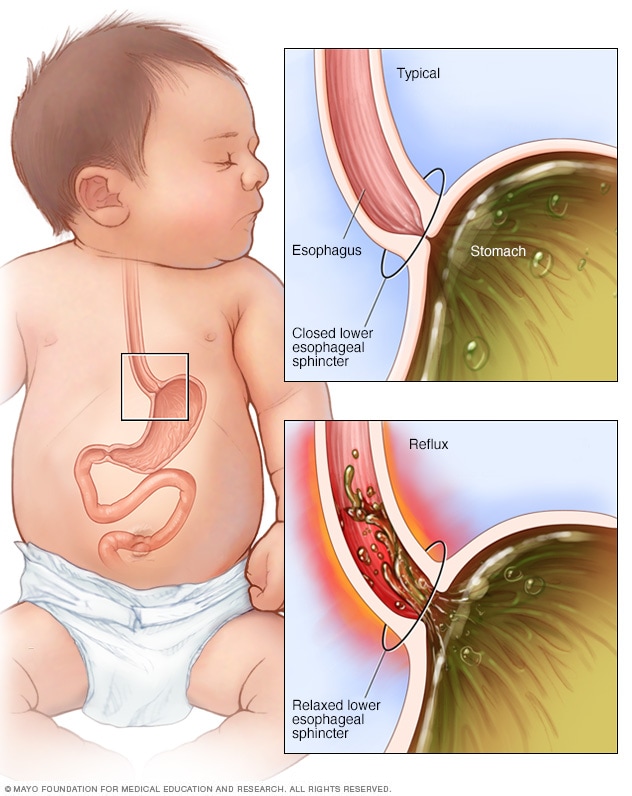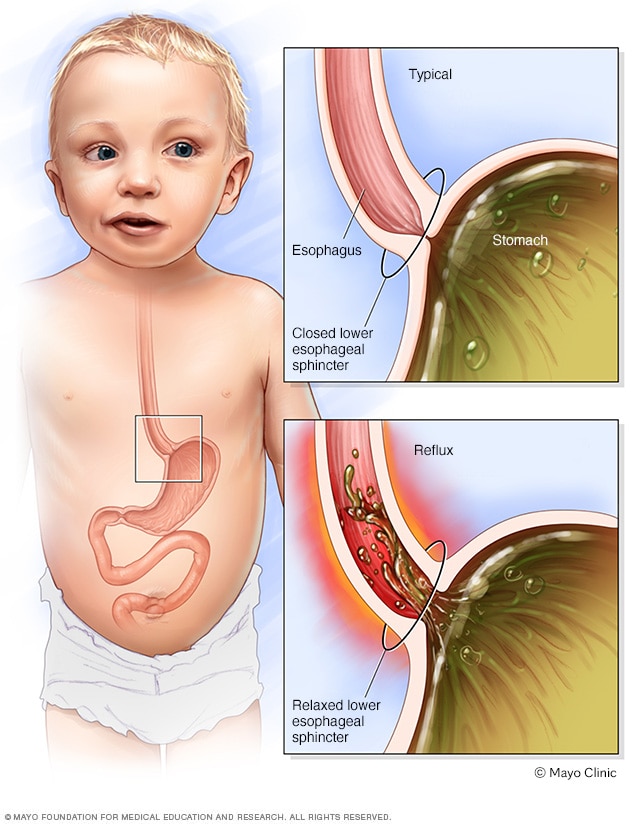Spitting up in babies: What’s normal, what’s not
Spitting up is a rite of passage for many babies. Here’s what’s behind spitting up — and when it might signal a more serious problem.
You’ve just fed your baby breast milk or formula only to watch him or her spit up what seems like all of it. Is this normal? Find out the possible causes of spitting up, and what you can do about it.
What causes spitting up?
How infant reflux occurs

How infant reflux occurs
The muscle between the esophagus and the stomach is called the lower esophageal sphincter. If this muscle relaxes when the stomach is full, food might flow up a baby’s esophagus.
Spitting up is common in healthy babies. During their first three months, about half of all babies experience their stomach contents coming back up into the esophagus, a condition known as gastroesophageal reflux, infant reflux or infant acid reflux.
Normally, a muscle between the esophagus and the stomach (lower esophageal sphincter) keeps stomach contents where they belong. Until this muscle has time to mature, spitting up might be an issue — especially if your baby is relatively full.
What is the difference between spitting up and vomiting?
Spitting up is the easy flow of a baby’s stomach contents through his or her mouth, possibly with a burp. Vomiting occurs when the flow is forceful — shooting out inches rather than dribbling from the mouth.
It seems like my baby is spitting up a lot. Can spitting up affect my baby’s growth?
Normal spitting up doesn’t interfere with a baby’s well-being. As long as your baby seems comfortable and is eating well and gaining weight, there’s little cause for concern. If your baby is gaining weight, then he or she isn’t being harmed by the calories lost through spitting up.
Keep in mind that it’s easy to overestimate the amount your baby has spit up based on the size of a spit-up stain.
Will my baby outgrow spitting up?
Most babies stop spitting up by age 12 months.
What can you do to reduce spitting up?
Consider these tips:
- Keep your baby upright. Feed your baby in a more upright position. Follow each feeding with 30 minutes in an upright position. Avoid immediate active play or use of an infant swing.
- Avoid overfeeding. Feeding your baby smaller amounts, more frequently might help.
- Take time to burp your baby. Frequent burps during and after each feeding can keep air from building up in your baby’s stomach.
- Put baby to sleep on his or her back. To reduce the risk of sudden infant death syndrome (SIDS), it’s important to place your baby to sleep on his or her back. Placing a baby to sleep on his or her tummy to prevent spitting up isn’t recommended.
- Experiment with your own diet. If you’re breast-feeding, your baby’s doctor might suggest that you eliminate dairy products or certain other foods from your diet.
Can spitting up be a sign of a problem?
Certain signs and symptoms might indicate an underlying condition or something more serious than run-of-the-mill spitting up. Contact your baby’s doctor if your baby:
- Isn’t gaining weight
- Spits up forcefully
- Spits up green or yellow fluid
- Spits up blood or a material that looks like coffee grounds
- Refuses feedings repeatedly
- Has blood in his or her stool
- Has difficulty breathing or other signs of illness
- Begins spitting up at age 6 months or older
- Cries for more than three hours a day and is more irritable than normal
- Has fewer wet diapers than usual
Treatment depends on what’s causing the problem. Special feeding techniques might be helpful. In other cases, the doctor might prescribe medication to treat reflux.
Children’s health information and parenting tips to your inbox.
Sign-up to get Mayo Clinic’s trusted health content sent to your email. Receive a bonus guide on ways to manage your child’s health just for subscribing. Click here for an email preview.
To provide you with the most relevant and helpful information, and understand which information is beneficial, we may combine your email and website usage information with other information we have about you. If you are a Mayo Clinic patient, this could include protected health information. If we combine this information with your protected health information, we will treat all of that information as protected health information and will only use or disclose that information as set forth in our notice of privacy practices. You may opt-out of email communications at any time by clicking on the unsubscribe link in the e-mail.
Thank you for subscribing
Our e-newsletter will keep you up-to-date on the latest health information.
Something went wrong with your subscription.
Please try again in a couple of minutes
Jan. 27, 2023
Products and Services
.






Leave a Reply